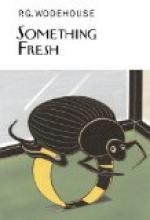Joan’s eyes opened wide.
“Meek! Have you ever seen an English lady’s maid, Mr. Marson?”
“Why, no; now that I come to think of it, I don’t believe I have.”
“Well, let me tell you that meekness is her last quality. Why should she be meek? Doesn’t she go in after the groom of the chambers?”
“Go in? Go in where?”
“In to dinner.” She smiled at the sight of his bewildered face. “I’m afraid you don’t know much about the etiquette of the new world you have entered so rashly. Didn’t you know that the rules of precedence among the servants of a big house in England are more rigid and complicated than in English society?”
“You’re joking!”
“I’m not joking. You try going in to dinner out of your proper place when we get to Blandings and see what happens. A public rebuke from the butler is the least you could expect.”
A bead of perspiration appeared on Ashe’s forehead.
“Heavens!” he whispered. “If a butler publicly rebuked me I think I should commit suicide. I couldn’t survive it.”
He stared, with fallen jaw, into the abyss of horror into which he had leaped so light-heartedly. The servant problem, on this large scale, had been nonexistent for him until now. In the days of his youth, at Mayling, Massachusetts, his needs had been ministered to by a muscular Swede. Later, at Oxford, there had been his “scout” and his bed maker, harmless persons both, provided you locked up your whisky. And in London, his last phase, a succession of servitors of the type of the disheveled maid at Number Seven had tended him.
That, dotted about the land of his adoption, there were houses in which larger staffs of domestics were maintained, he had been vaguely aware. Indeed, in “Gridley Quayle, Investigator; the Adventure of the Missing Marquis”—number four of the series—he had drawn a picture of the home life of a duke, in which a butler and two powdered footmen had played their parts; but he had had no idea that rigid and complicated rules of etiquette swayed the private lives of these individuals. If he had given the matter a thought he had supposed that when the dinner hour arrived the butler and the two footmen would troop into the kitchen and squash in at the table wherever they found room.
“Tell me,” he said. “Tell me all you know. I feel as though I had escaped a frightful disaster.”
“You probably have. I don’t suppose there is anything so terrible as a snub from a butler.”
“If there is I can’t think of it. When I was at Oxford I used to go and stay with a friend of mine who had a butler that looked like a Roman emperor in swallowtails. He terrified me. I used to grovel to the man. Please give me all the pointers you can.”
“Well, as Mr. Peters’ valet, I suppose you will be rather a big man.”
“I shan’t feel it.”
“However large the house party is, Mr. Peters is sure to be the principal guest; so your standing will be correspondingly magnificent. You come after the butler, the housekeeper, the groom of the chambers, Lord Emsworth’s valet, Lady Ann Warblington’s lady’s maid—”




